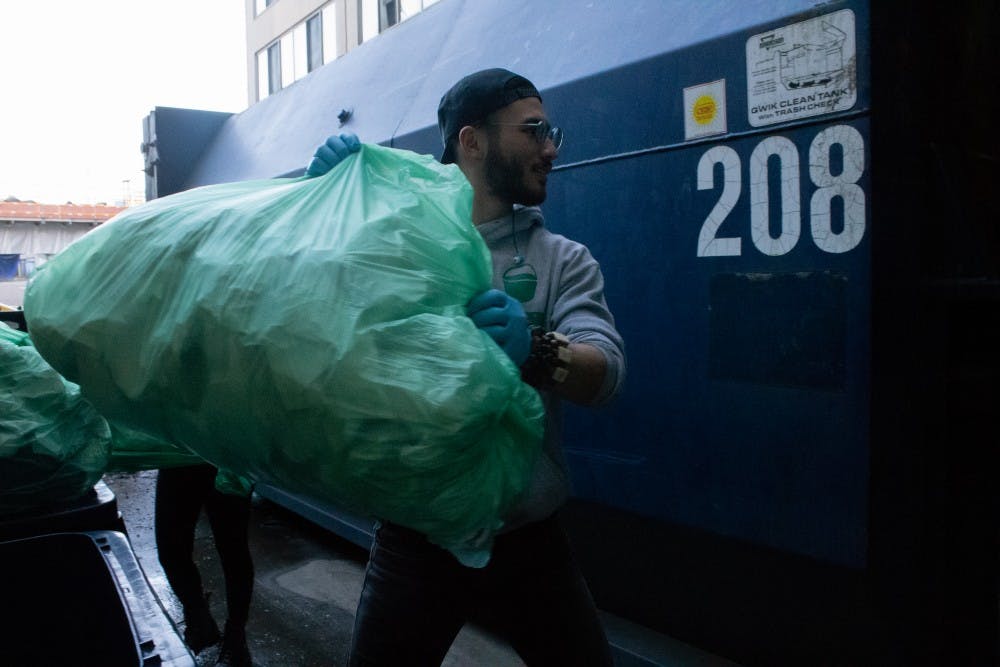Climate change is a big and looming issue, but it doesn’t have to be so intimidating. The (Com)Post is The Eagle’s new sustainability series that breaks down topics in eco-friendly living in a fresh, actionable and fun way.
When it comes to recycling efforts at AU, the Composting Crew has it covered.
The group of seven freshmen is successfully leading composting efforts after a series of hurdles over the past few years.
“Things started great, and then we had issues with a lot of cross-contamination,” said Steven Birchfield, site operations supervisor for Prince George’s County Organic Composting.
AU’s contract with the Prince George’s facility nearly ended in February 2015 because of all the contaminated organic waste AU sent to the facility. The composting center ultimately renewed the contract on one condition: that AU’s waste would be sorted properly the next time they sent it.
AU Zero Waste launched a new program in 2017 that offered students personal composting bins as well as added larger composting bins around campus. This effort was later met with a larger new initiative put into motion by Tyler Orton, AU’s zero waste manager.
Orton hired graduate student Anya Pforzheimer in August to better AU’s food waste collection processes. Pforzheimer then kickstarted the “Composting Crew,” an entity separate from the Zero Waste club, which comprises of a team of seven freshman interns: Tanvi Chopra, Jesse Cross, Delfina Forlenza, Benjamin Scheiner, Miesha Burnam, Zoe Parsons and Erin Aymerich.
“My interns are the only ones that really touch compost anymore,” Pforzheimer said. ”[They] are in charge of sorting it and making sure it’s not contaminated.”
During the first week the Composting Crew ran the program back in October, they collected 265 pounds of food waste. Now, the crew picks up nearly 13 times that amount, collecting 3,350 pounds of waste the week of Feb. 18 alone.
“The biggest thing that’d be nice is if students understand that there are other kids going through their stuff,” Pforzheimer said. “If students were like ‘I’ll just throw this away, it doesn’t matter,’ there’s seven kids out there in the rain being like, ‘I really wish someone hadn’t thrown this trash bag in here.’”
It takes spending a day the interns to see the extent of what they do. Their shifts are twice a day between 10 a.m. and 12 p.m. and 4 p.m. and 6 p.m. Cross starts the engine in the white pickup truck they use to cart and collect composting bins, far better than the golf carts they used to use at the beginning of the year, he said.
In the kitchen of the Terrace Dining Room, Forlenza lifted one of the lids off the composting bins, uncovering cantaloupe and honeydew melon scraps. Using a handheld digital weight, Cross raised the bucket while Forlenza read the weight: about 65 pounds each. The two interns carried the bins from the back of TDR and loaded them on to the truck before setting off for their next stop.
After all the bins are collected, the interns drove to the compactor located next to the entrance of lower level Anderson. Using gloves, the interns sort through the waste for any contamination before placing the final compost in the compactor.
“I guess the only thing I dislike is seeing an alcohol bottle or something end up in one of the compost bags,” Cross said. “But I really do love most of what we do.”
Birchfield said that he would like to see AU step up to match colleges like the University of Maryland, which sends the facility 28 tons of organic waste per week.
“Now the things coming in are looking great,” Birchfield said. “I would love to see AU take it to the next level.”
This article originally appeared in The Eagle's March 2019 print edition.





